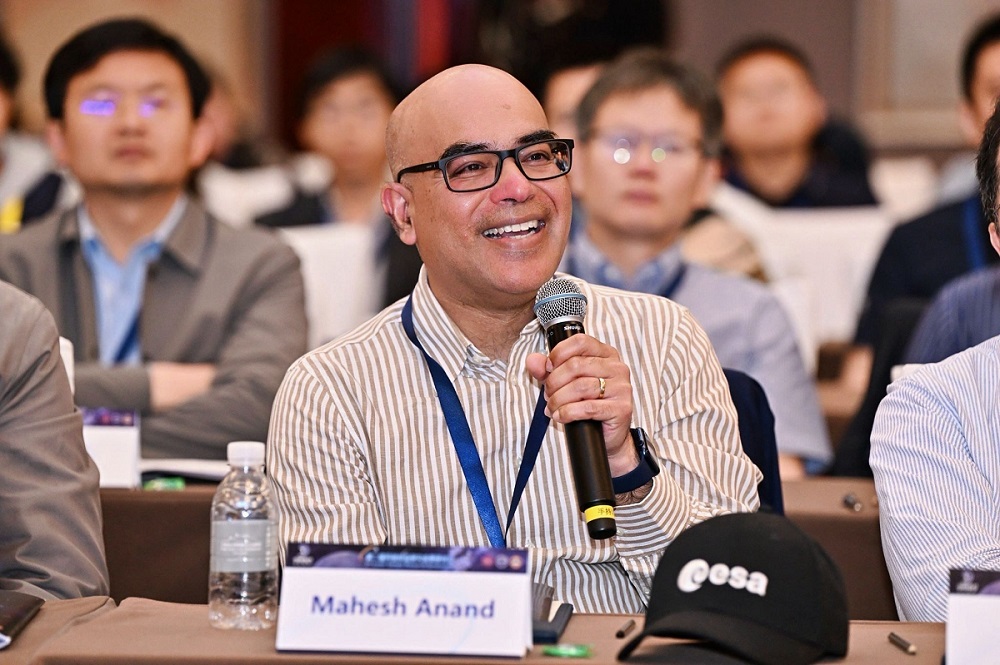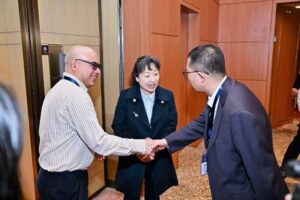OU News
News from The Open University
- Home
- OU space expert among world’s first to receive moon samples from China’s Lunar Exploration Program for research
OU space expert among world’s first to receive moon samples from China’s Lunar Exploration Program for research
Posted on • Science, maths, computing and technology

An academic from The Open University (OU), Professor Mahesh Anand, has been selected as the first scientist from the UK to receive Moon samples from China’s Lunar Exploration Program for conducting research.
The sample comes from the Chinese lunar mission, Chang’e 5, which returned Moon samples to Earth in December 2020.
Professor Anand applied to conduct research on Chang’e-5 samples in Dec 2023 and is one of 7 experts from around the world selected to receive these invaluable samples.
This is the first time lunar samples returned by a Chinese space mission will have been allocated to international principal investigators.
To receive the sample, Professor Anand is travelling to China, where he will sign the sample loan agreement and participate in the China Space Day ceremony in Shanghai on 24th April before collecting the samples from the Chinese lunar curation facility in Beijing on 25th April.

Prof Anand meets the Director of Lunar Exploration and Space Engineering Centre (LESEC)
Once back in the UK, the Chang’e-5 samples will be analysed using the OU’s state-of-the-art laboratories located on its Milton Keynes campus, where Professor Anand and his team will carry out their research.
The loan agreement is for a year, and during that time, the OU team is planning to determine the amount and isotopic composition of carbon, nitrogen, oxygen and noble gases in Chang’e-5 samples, results from which will be used to evaluate the giant-impact origin of the Moon and develop new insights into the history of volatiles such as carbon and nitrogen in the Earth-Moon system.
Professor Anand said:
“It is a great honour and privilege for my team to be selected as one of the first international teams to receive lunar samples from the Chang’e-5 mission for research.
This is a recognition of our world-leading lunar sample research, underpinned by long-term funding from the Science and Technology Facilities Council (STFC/UKRI) and the OU’s commitment towards maintaining world-class analytical laboratories. I look forward to working on these precious lunar samples and building new international collaborations and partnerships.”
Professor Anand has been conducting lunar research for over 20 years, working with colleagues at the OU to uncover secrets of the Moon, including the presence of water on the surface.
A spokesperson for the Chinese National Space Agency (CNSA), said:
“Guided by the principles of equality, mutual benefit, peaceful utilization, and win-win cooperation, China National Space Administration engages in international exchanges and cooperation in aerospace. The international sharing of lunar samples and joint research efforts enable scientists from around the world to study the Moon’s formation and evolution, fostering collaborative exploration of the universe’s mysteries.”
Dr James Carpenter, Head of the Lunar Science Office, European Space Agency (ESA), added:
“It is great to see this important milestone in the scientific cooperation between Europe and China. The Chang’e 5 lunar samples provide a unique window into the history of the Solar System, and the Open University is one of the best places in the world to unravel the scientific story that’s these samples have to tell.”